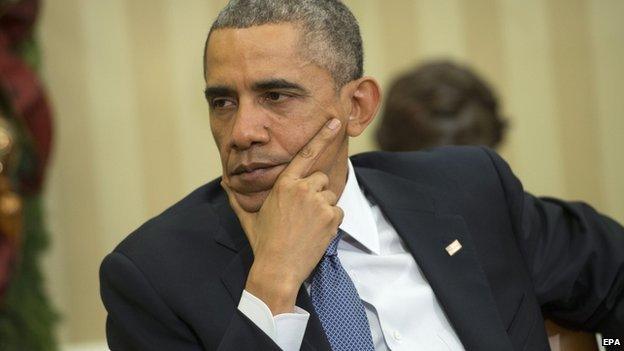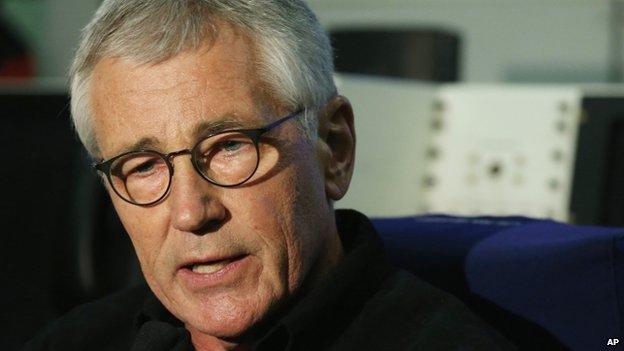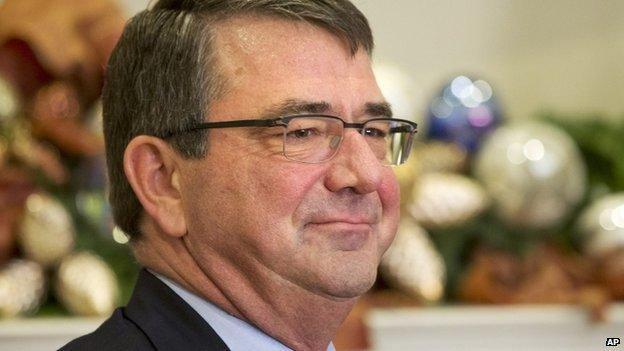US needs to show it's still top dog
- Published
- comments

President Obama: Let down by lieutenants?
Once upon a time the job of president of the United States seemed clear-cut: you knew who the enemy was, and you knew you had the economic and military measure of them.
You were seen as the most powerful man in the world.
That isn't necessarily the case any more.
True, no other political leader has the reach or resources of Barack Obama.
Compared with him, China's Xi Jinping looks like a decidedly local political chieftain with a big chequebook, but with nothing very serious in the way of firepower.
Russia's Vladimir Putin appears almost bankrupt. The naval ships he took to the G20 summit in Brisbane in order to flex his famous muscles were so old-fashioned they made people laugh.
As for Europe, it seems to have vanished down a plughole of its own creating.
Yet none of this means that the US is what it once was, because the US too has faded.
It no longer has the glittering wealth it once possessed, and it has been knocked back and fazed so many times that it doesn't scare people as it once did.
It is still "the indispensable power" that Madeleine Albright, the US Secretary of State from 1997 to 2001, declared it to be.
Most disputes around the world imply some involvement, great or small, for the US. The US Embassy in most capital cities is the one that really counts.
Risen to the challenge
Not long ago the former US ambassador in London, Louis Susman, addressed the notion of the US's waning powers in a thoughtful speech, external.
Each time the US's standing in the world was questioned, he said, it had risen to the challenge and proven the doom-mongers wrong. Three factors made this possible:
"First, the strength of our economy. Second, our military prowess. Third, the power and scope of our international partnerships."

Chuck Hagel never seemed to enjoy his job
He was right - up to a point. What is difficult for outsiders to tell is whether the US really is feebler than it was once, or whether Barack Obama's slowness in making decisions merely gives that impression.
And Mr Obama's lieutenants haven't helped.
John Kerry, the Secretary of State, is no Madeleine Albright, while Joe Biden, the Vice-President, has never impressed.
Nor did Chuck Hagel, the Defence Secretary who lasted only 21 months in the job, and now seems set to be replaced by his deputy, Ashton Carter.
Mr Hagel never seemed remotely happy in the job.
He wasn't good at communicating, and he didn't have the grasp of detail that is mandatory in a job which is almost as much technical as it is political.
Worse, he didn't seem to have the confidence of the people round the president.
Assertive officialdom
The Obama White House is full of assertive officials who want to tell every senior figure in the administration what to do; this is what happens under a president who is not particularly assertive himself.
The hawkish new nominee as defence secretary won't be so easy to push around.
Ashton Carter has a habit of being right about things.

Ashton Carter: Sharp intellect
A couple of years ago, he was arguing that US forces should stay in Iraq and Afghanistan. Now, having supposedly left, the US is already scrambling to get back in both countries.
People don't praise Mr Carter much for his warmth or humility.
He has a reputation for incisiveness and plain-speaking which can look like arrogance.
But he could bring an element of steel to an administration which has so often seemed wishy-washy.
A man who understands with genuine clarity what level of force is required to support the Afghan government against the Taliban, and the Iraqi government against Islamic State (IS), will be welcomed - not just in Kabul and Baghdad, but in capitals from London and Paris to Canberra.
Louis Susman, the former US ambassador in London, left out one essential element in the US's ability to keep up its standing in the world.
It's not just about economic and military strength and international partnerships: it's about looking and sounding tough.
Under President Obama, the US has all too often given the impression that it can't make its mind up about the most important issues of the day, from Syria and fighting IS to the way it deals with Iran, China and Russia.
Maybe Ashton Carter's sharp intellect and grasp of detail will help with that.
Unless, of course, he finds himself isolated and edged out because his style doesn't fit.